- Home
- Douglas E. Richards
Time Frame Page 7
Time Frame Read online
Page 7
“So you want to target North Korea’s Supreme Leader,” said Blake. It wasn’t a question.
Cargill nodded grimly. “Can you think of anything else we could possibly do that would better relieve global tensions? Let’s get rid of this maniac once and for all.”
13
Blake and Cargill, alone in the abandoned conference room, stared deeply into each other’s eyes, studying each other’s resolve and body language.
When Blake didn’t speak for several seconds, Cargill pressed on. “No one is more of a powder keg than Kim Jong-un,” he said. “We all know it. Ruthless, demented, and totally arbitrary.”
“And sitting on a growing number of nuclear weapons,” added Blake, “and the intercontinental ballistic missiles to deliver them.”
Cargill’s lip curled up in disgust. “I have a dossier for you to read. However ruthless and brutal you think Kim is, the unreported intel we have on him shows that this is just the tip of the iceberg. It’s a miracle he hasn’t nuked millions of people yet, just for grins.” He shook his head. “It really is time for him to go. In fact, it’s now almost a decade overdue.”
“Isn’t this something that Knight recommended?” said Blake. “Something you rejected? When we first met,” he continued, “you said that using teleportation to kill someone like Kim was an example of a slippery slope you didn’t want to step onto.”
“Yeah, well, that slippery slope wasn’t teleportation. It was human duplication. If teleportation could have been achieved without duplication, I’d have no problem with it. And as you know, I’ve now broken my own rule against duplication. I’ve taken such a giant step onto that slope that I’ve slid straight down to the cesspool at its bottom. I will climb back up again. But before I do, we need to take advantage of a golden opportunity to rid the world of this asshole. And things have changed since I ruled out this kind of operation. Beyond the fact that I’ve already duplicated humans when I swore I never would.”
“What kind of things?” said Blake.
“It hardly seems possible,” replied Cargill, “but we both know that Kim is getting even more unstable lately. Perhaps bold is the better word for those who believe him to be fully sane. We’ve been running out of time for a long while, but it’s hard not to think we’ve reached the two-minute warning. Besides, Knight’s plan for taking him out wouldn’t have worked. It was too risky, requiring someone to get within fifty-eight feet of him with a kettle. Next to impossible. His protection detail makes the US Secret Service look like one elderly man with a walker.”
Cargill shook his head and continued. “And even if such an assassination attempt did succeed, killing Kim isn’t enough. Not when we don’t know how to disarm his country. Where all of his nukes are hidden. Or who might fill the vacuum left when he’s gone. We don’t know if the dictator who replaces him would feel the need to retaliate to cement his hold on power. The eventual repercussions of an assassination could be even worse than what we’re dealing with now.”
“So your quarrel with Knight wasn’t that he wanted to use this tech to take out a dangerous tyrant,” said Blake. “It was just that you didn’t find his plan an effective one.”
“No. Again, I was pure as a virgin and wanted a total ban on human duplication, then and forevermore. And even though I broke my own rule, I still want the same thing. But before I put this genie back in the bottle, we have an unprecedented opportunity to end a North Korean nightmare decades in the making. Because we now have a range of over a hundred miles, and the ability to nest kettles. So we should be able to assassinate one version of Kim and kidnap and keep another.”
“You’re certainly ambitious,” said Blake. “I’ll give you that.”
“If we’re behind an assassination,” said Cargill, “it’s a clear act of war. Pyongyang might retaliate, perhaps striking at Seoul, or at us directly.”
“But if a bomb blows up in Kim Jong-un’s bedchambers,” said Blake, “it’s hard to blame the US. Unless someone can explain how we did it. Which no one would be able to do.”
“That’s one possibility,” said Cargill. “If we went with that, North Korea and the world would assume that those around Kim finally got tired of serving a madman. In the days and weeks it will take Pyongyang to sort it all out, fill the power void he leaves behind, we could be milking this sick bastard for intelligence. We could make multiple duplicates of him so we can see what drugs or torture or inducements work the best. We could get all the intel we need to make sure we disarm the North Korean powder keg he left behind.”
“Maybe,” said Blake. “But what if you find that squeezing the right intel from this maniac is more difficult than you anticipated?”
“Then we’ll just have to try harder,” said Cargill simply. “We’ll get it, and quickly, one way or another. Of that I have no doubt. We can make five copies of him and use cross interrogation. Glean one nugget from one of them and use it with another to show we know a lot more than he thinks—really get inside this tyrant’s head. Plus, I’m still in touch with a number of scientists within black weapons groups. Scientists who used to work for me.”
“And they’ll still talk to you?” said Blake with mock incredulity.
Cargill laughed. “Working for me was a little less challenging for them than it has been for you, I have to admit. But yes, I’m still close to many of them. The point is, there’s a new experimental truth serum I’ve become aware of. It’s called T-4. Supercomputer simulations that take into account everything we know about the brain, and neuronal mapping, suggested it would be absolutely effective. The perfect truth agent. So it was moved into limited human testing.”
“How limited?”
“Very. Because the simulations also indicated that it would kill roughly half of those who got it within a minute of administration. An unfortunate little side effect,” added Cargill sarcastically.
“If it kills half the people,” said Blake, “it’s a poor interrogation drug. A dead subject is really good at keeping secrets.”
“Which is why it’s still being perfected.”
“Given it’s as lethal as it is, how was it tested?”
“Six times only. It was used twice in terror situations where this was the only choice. And four times on inmates about to be executed, who agreed to be guinea pigs in exchange for a commutation of their death sentences.”
“Assuming they survived T-4,” noted Blake dryly.
“Right. Anyway, these six, while a small number, give its developers confidence the simulations are correct. Half died, and the other half spilled their guts. All the information provided by the half who survived checked out as one hundred percent accurate. There is no doubt that if a subject survives the first five minutes, T-4 works like a charm.”
“So you plan to check in with your scientist friend,” said Blake. “See if he’s made any progress on improving the drug.”
“Correct.”
“You said that blowing Kim up was one possibility. You have another?”
“Yes. One that I think will buy us more time—and create tremendous discord in North Korea. What if we jumped in and hit him with a slow poison after we knocked him out? There’s a new one I know of. Inject him, and he’ll feel just fine for three or four days. But he won’t be. At some point on the third or fourth day, he’ll drop dead abruptly from a massive heart-attack.”
“How does a drug like that work?” asked Blake.
“I have no idea. All I know is that it does. So we could teleport one copy of the unconscious Kim a hundred yards away from the palace, one that we’ve poisoned. And we could teleport another copy of Kim out to be interrogated. Then we could blow the kettle, taking the palace with it.”
Blake nodded thoughtfully. “Remind me not to play chess with you,” he said, a mixture of admiration and horror in his tone. “Wow,” he added as he continued working out the implications. “So Kim wakes up, alive, having no idea how he ended up outside the palace, but thinking someone tried to take hi
m out. Convinced he was the target of an attempted coup.”
“Think about how pissed off that will make him,” said Cargill with a smile. “He won’t be looking at us, he’ll be looking within. Not knowing who to trust. Interrogating his most trusted lieutenants. Purging his own government.”
Blake nodded. It was brilliant. The word diabolical came to mind. Much more paralyzing and destabilizing than even an outright assassination would be.
“Meanwhile,” continued Cargill, “we’ll have a copy of Kim to play with. And we’ll have bought ourselves three extra days to get intel. When Kim dies from a heart attack, the country will be even more disoriented. Then we can strike at his nukes and missiles. Whatever it takes to defang North Korea. Bombing runs. Special forces boots on the ground. He’ll show us where all of North Korea’s family jewels are kept, and we can crush them in one fell swoop. Kill the chicken while its head’s cut off.”
Blake stared at him, deep in thought, but didn’t respond.
Cargill inhaled deeply. “But let me get back to your comment about Knight,” he said. “Don’t forget that my refusal to use time travel as an assassination tool was the least of the points of contention between us. He also wanted to form a world government with himself at the helm. Or behind the scenes pulling the strings. He wanted to duplicate whoever he pleased without their knowledge and against their will. He wanted to institute a widespread eugenics program. And so on. So when the North Korean threat is neutralized, we’ll have eliminated the two biggest threats to civilization this century. You’ll have eliminated them.”
“Is that an appeal to my ego?” asked Blake.
“No. Just a statement of fact.”
“How far along is your planning for this Op?”
“It’s nearly complete,” said Cargill. “I started before we took out Knight. The key to moving forward was Daniel’s confirmation that nesting is now possible. Not that we’d want to nest more than a single kettle. Making a series of jumps makes cleaning up after ourselves that much more difficult.”
“Why would we even need a series of jumps?” said Blake. “Having a teleportation range of one hundred twenty miles turns this Op from impossible to relatively straightforward. Isn’t Seoul within this distance of Pyongyang?”
“Just barely, but yes. Unfortunately, it won’t be that easy.”
“Why not?” said Blake. “Just to be clear, exploring this idea further doesn’t mean I’ve agreed to the mission. But just for the sake of argument, I could land with two nested kettles in Seoul. I wouldn’t even have to leave the runway. I could teleport into Kim’s bedroom inside the inner kettle, while he’s sleeping—say at three or four in the morning—drug him, shove him into the kettle, and send his chubby ass back out to my plane in Seoul.”
Cargill frowned. “It would be this simple, except for one wrinkle. It’s not common knowledge,” he said, “but Kim doesn’t sleep inside the palace at Pyongyang anymore. Hasn’t for almost a year. He’s more paranoid than ever.”
Blake raised his eyebrows. “It isn’t paranoia if there really are people who want you dead. In his case, it would be hard to find people who don’t want him dead.” He paused. “So where does he sleep nowadays?”
“At another of his palaces, northeast of Hyangsan, which itself is northeast of Pyongyang. Built at the foot of a mountain.”
“How far away from Pyongyang?”
“Just under a hundred miles. Hyangsan is almost the exact geographical center of the country. I don’t blame Kim for sleeping there. It probably is the safest region in North Korea. And it’s only a thirty-minute helo ride to the capital, so still fairly convenient.”
“But it puts him out of teleportation range of any border,” said Blake.
“I’m afraid so. You didn’t want this to be too easy, did you?”
“So what did you have in mind if I were to agree?” asked Blake.
“I’d want you to cross into North Korea from China. China is Kim’s benefactor, and its border with North Korea is more porous than the border between the two Koreas. Not to mention that the two Koreas have a demilitarized buffer zone between them.”
“And you have all the logistics buttoned up?”
“Nearly,” said Cargill. “Just a few finishing touches. But once you’re across the border, you could carry out the exact plan we just discussed. Get within range, teleport into his palace in Hyangsan, and teleport him back out.”
“To where?”
“Still working out the details, but probably either the Swedish or UK embassies in Pyongyang. America doesn’t have an embassy in North Korea, of course, but we can get operatives inside the embassies of our good friends. We could have you teleport Kim into an empty room and have our guys smuggle him to South Korea and on to America.”
“By our guys, I assume you mean members of our Inner Circle.”
“Yes. Specifically, Eric Beal and Chris Entwistle. They both have extensive interrogation experience.”
Blake nodded slowly. “You do seem to have this all worked out.”
“I’ve tried,” replied Cargill.
“Give me some time to think,” said Blake, before lowering his eyes to do just this.
Cargill waited patiently as his colleague mulled this over.
“If what you’ve outlined was all there was to it,” said Blake finally, “it’d be an easy decision. But we have to vaporize the Kim that will remain in the bedroom after the two copies have been teleported out. We’d want to blow up the kettle left in the palace as part of the clean-up regimen in any case.”
He frowned deeply. “Which also means vaporizing the Aaron Blake left behind. The two Aaron Blakes left behind, since I’m sure you’ll want to also blow the kettle I use to jump inside the palace in the first place.”
Cargill winced. “I know what I’m asking, Aaron. You’ve already made the ultimate sacrifice. Asking you to go on another suicide mission is the last thing I want to do. But you’ve proven just how good you really are. We need someone with your remarkable abilities. There can’t be any mistakes. You know the old saying, ‘if you’re going to shoot at the king, you better make damn sure you don’t miss.’”
“I’m not sure I’m as good as you think,” said Blake. “And there’s always a risk of failure. So what happens if we put a time machine into the hands of North Korea? Talk about blowing up in our faces.”
“That wouldn’t be . . . ideal,” said Cargill. “But it wouldn’t be catastrophic. They would have no idea what it was. Especially since the kettle I plan to use for this mission has been disguised to look like a large refrigerator. One without any inside shelves, of course.”
“What’s the matter,” said Blake with a grin, “you couldn’t fit it inside a DeLorean?”
Cargill smiled back. “I’m having a few more of these refrigerator kettles made for our possible use in the States. Along with some other configurations for emergencies.”
“Emergencies?” said Blake.
“Look, I’m getting off topic. The point is, while I don’t want a kettle to get into North Korean hands, it wouldn’t be the end of the world. We booby trap all kettles, anyway, so that reverse engineering isn’t possible. And they’d never be able to use it without the proper passwords. But you’d be under no such restrictions,” he hastened to add. “In case you had to improvise, I’d give you total control of the kettles, first the outer and then the inner. They’d be linked to your vital signs and programmed to respond to your voice commands like a favorite PDA.”
Blake nodded grimly. “You pamper me way too much,” he deadpanned.
“I know how much of a sacrifice this is, Aaron,” said Cargill softly, lowering his eyes. “And I’m truly sorry to even have to ask. But you’re not just my first choice, you’re my only choice. The only operative I’m confident will not fail, no matter what the circumstances.”
Blake frowned. The man didn’t exactly have a limitless group of soldiers to choose from. Given that only a handful of people knew
about Q5 and time travel, of course Blake was his top choice.
“You should know, Aaron,” said Cargill, as though reading Blake’s mind, “that if I could choose any commando in the world, I’d still pick you. You’re remarkably resourceful. You can make lightning-fast decisions under fire. And you always seem to find a way to win. This puts you in your own class of formidable.”
“So all I have to do is agree to condemn other versions of me to death,” said Blake. “I just have to send a duplicate or two off to get blown up for me, like I did before, while I sit here drinking umbrella cocktails. What could be easier?”
“Just about anything,” said Cargill. “I’m well aware. You weren’t the only one who allowed a duplicate to be knowingly killed on this last Op. So did I. Remember, one of me was shot in the head. I know how hard it was to allow this to happen. Because while I wasn’t the one shot, I committed my double to being a human sacrifice. We both know the copy of you sent on this mission will remember this discussion, know that you—he—agreed to saddle himself with a suicide mission. And his love of life will be just as strong as your own.”
Blake scowled for several long seconds, but this was suddenly replaced by a look of amusement. “Remember that guy in the Revolutionary War?” he began. “The one who said that his only regret was that he had but one life to give for his country?”
“Yeah, Nathan Hale,” said Cargill. “What about him?”
Blake grinned. “Well, he’s really beginning to piss me off. Because my only regret is that I seem to have an infinite number of lives to give for my country.”
“It does suck to be yous,” said Cargill, also breaking into a grin. “Sorry. Couldn’t resist. Gallows time travel humor.”
“Hilarious,” said Blake dryly. This was followed by a long silence. “So if I did agree to this mission,” he said finally, “when would I start?”
“You’d leave in two or three days,” replied Cargill. He shrugged. “No time to waste.”
“A quick operational question,” said Blake. “Won’t Kim have security cameras in his bedroom that will pick up my arrival? Sensors that his security team will be monitoring?”

 Oracle
Oracle![[2016] Infinity Born Read online](http://i1.bookreadfree.com/i/03/18/2016_infinity_born_preview.jpg) [2016] Infinity Born
[2016] Infinity Born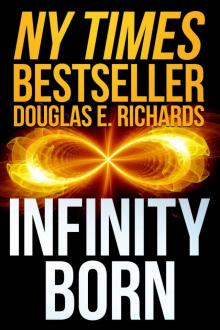 Infinity Born
Infinity Born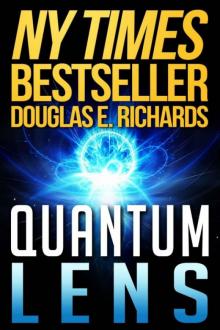 Quantum Lens
Quantum Lens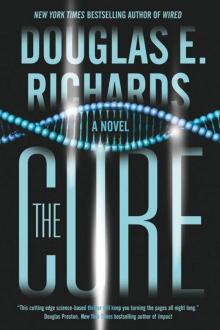 The Cure
The Cure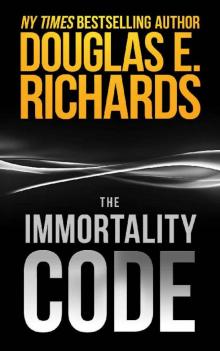 The Immortality Code
The Immortality Code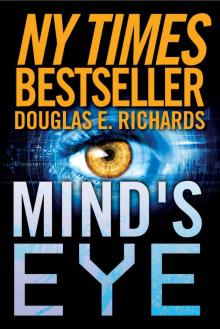 Mind's Eye
Mind's Eye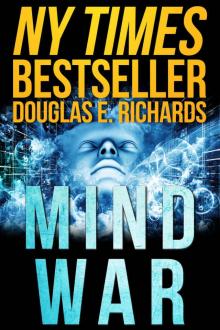 MindWar (Nick Hall Book 3)
MindWar (Nick Hall Book 3)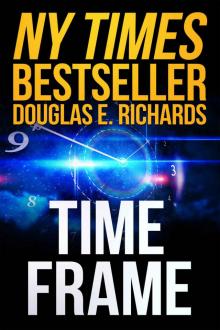 Time Frame (Split Second Book 2)
Time Frame (Split Second Book 2)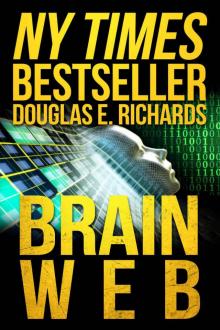 BrainWeb
BrainWeb Wired
Wired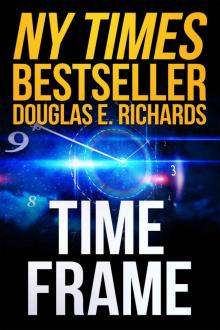 Time Frame
Time Frame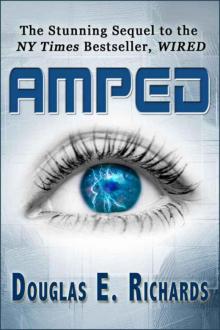 AMPED
AMPED Out of This World
Out of This World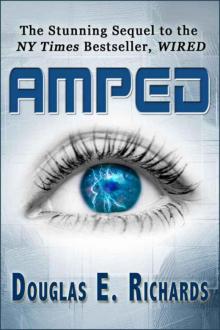 AMPED w-2
AMPED w-2